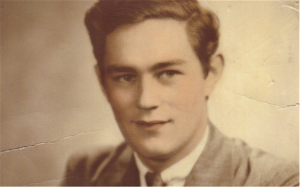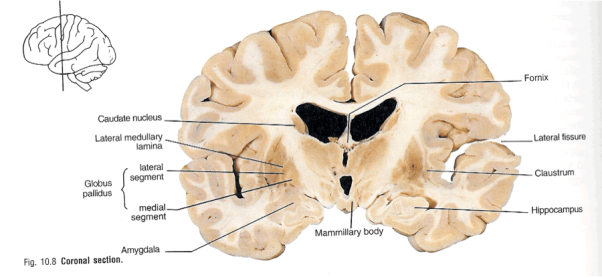Jamie Abbott, a Ph.D. candidate in the UVM Cellular and Molecular Biology Program, writes:
Have you ever had one of those days where you’re just not sure where you put your keys? And of course it’s the day you have three classes, a lab meeting, two assignments due, review session at 5, and soccer at 6. Not only can you not find your keys, but you can’t seem to remember if you e-mailed your colleague back or if you turned off the instrument when you finished your experiment last night or whether or not you ate breakfast this morning…
From experiences like this, one might question what part of the brain is associated with memory. Can memory be affected by external factors and stress?
The hippocampus, with unique regenerative properties and a rich scientific history, plays a fundamental role in memory, and recently has been linked to psychiatric disease.
The story of Henry Molaison: Functional role of the hippocampus in memory


The human brain can generate new neurons: Neurogenesis in the hippocampus
An additional fact that makes the hippocampus such a remarkable structure of the brain is that it is capable of creating new neurons, known as neurogenesis. The term neurogenesis does include the generation of neurons during development, but also the generation of neurons in adult brain tissue, which is what we will focus on. In the adult brain other regions able to carry out neurogenesis include the olfactory bulb and striatum [5].
The capability of the hippocampus to form new neurons was first demonstrated in a rat model [6] and subsequently discovered in postmortem human tissue samples [7]. So while there is evidence to support neurogenesis occurrence in the adult hippocampus, one may ask, “is it maintained over time?” Yes and no. While in humans the hippocampus is capable of adult neurogenesis during the entirety of lifespan, the overall effect is not additive and generally unable to replace cells lost during aging [8].
Aging is commonly associated with memory loss and there is an age-associated decrease in adult neurogenesis [9]. Interestingly, other external factors such as stress and social isolation can also negatively impact adult neurogenesis while exercise, learning and anti-depressants can increase neurogenesis in the hippocampus (as reviewed in [10]). In various mouse models these same factors have also been shown to influence memory. In a clinical trial, exercise was shown to improve cognitive function in elderly patients [11]. Maybe certain external factors or simple lifestyle changes can increase the function of adult neurogenesis to positively affect cognition. However, the molecular role of adult neurogenesis in memory has not been convincingly established.
Hippocampal neural circuit connections with other regions of the brain, specifically the lateral septum, hypothalamus and amygdala, also partly explain the hippocampus impact on mood and cognition beyond memory. Furthermore, lesion and electrophysiology studies of the hippocampus have demonstrated that function in memory, behavior and learning can be further partitioned structurally (as reviewed in [12]). The distinct zones of the hippocampus can be separated by gradient receptor expression or anatomical connections, and have different impacts on its function in behavior, memory or emotion. This is further supported by the observation that Molaison’s personality was not affected by the removal of a specific region of the hippocampus, only memory loss was observed. Genetic studies have also indicated that there exists a specific pattern of gene expression across the structure of the hippocampus [13]. A particular group of genes that were differentially expressed in the adult hippocampus were those with a role in axon guidance. Such genes could be expressed in the hippocampus in order to appropriately guide new neurons that develop during neurogenesis. It remains to be determined how these properties and patterns of gene expression in the hippocampus work together to impact emotions and behaviors.
Identifying the functional role of adult neurogenesis in hippocampus is not an easy undertaking. However, hippocampal dysfunction in connection with adult neurogenesis in many diseases has become more apparent and has acquired increasing interest from neuroscientists.
Implications of hippocampus dysfunction in psychiatric disorders: Adult neurogenesis as a new therapeutic target?
Since the hippocampus also has a role in learning, cognition and behavior by the very nature of its neural circuits, it might not come as a surprise to learn that its function in various diseases associated with cognitive decline is increasing. The hippocampus is implicated in cognitive decline with aging, Alzheimer’s disease, major depression, schizophrenia and even drug addiction. There are also many lines of evidence that suggest dysfunctional adult neurogenesis is a major contributing factor in these same disease states. Patients who suffer from major depression have a smaller hippocampus and, as mentioned earlier, anti-depressants can not only recover hippocampal volume but also increase adult neurogenesis. Schizophrenic patients or people who suffer from alcoholism have both reduced hippocampal volume and decreased adult neurogenesis (as reviewed in [14]). Recent studies have even indicated that enhancing neurogenesis in the hippocampus can reduce relapse following abstinence from cocaine use [15].
Evidently the role of the hippocampus in many psychiatric disorders warrants further investigation. Hypothetically, pharmacological enhancement of adult neurogenesis could be coupled with current therapies to provide greater benefits.
Frontier of neuroscience research on the molecular and cellular role of the hippocampus: neurogenetics, model systems, biomarkers, and beyond
While many classic neuroscience techniques have given researchers significant traction toward our understanding of the hippocampus, much work remains. In the past few years there has been increasing interest and support to investigate the molecular basis of neuropsychiatric diseases with programs such as the BRAIN initiative http://www.braininitiative.nih.gov/. Furthermore, genetic studies have recently identified potential targets for these disorders [16]. Armed with this new information, identifying the role of adult neurogenesis in hippocampal function and dysfunction is now, more than ever, a realistic objective [17].
Looking forward, neuroscience researchers have many different tools at their disposal today to probe neurogenesis as a potential therapeutic target. To hear more about the advancement of these tools and their potential applications for research and therapy tune in to the Keystone’s mini-symposia: “From Neuroscience to Therapy: How Do We Get There?”.
The archived version is now available to watch here. This version on our website will be available for 30 days and includes the full Q&A session. After that, it will be available on the YouTube channel.
References
- Scoville, W.B. and B. Milner, Loss of recent memory after bilateral hippocampal lesions. J Neurol Neurosurg Psychiatry, 1957. 20(1): p. 11-21.
- Image retrieved from: http://www.telegraph.co.uk/culture/10047050/Henry-Molaison-The-incredible-story-of-the-man-with-no-memory.html
- Image retrieved from: http://homepage.smc.edu/wissmann_paul/physnet/ anatomynet/anatomy/neurolink.html
- Annese, J., et al., Postmortem examination of patient H.M.’s brain based on histological sectioning and digital 3D reconstruction. Nat Commun, 2014. 5: p. 3122.
- Ernst, A., et al., Neurogenesis in the striatum of the adult human brain. Cell, 2014. 156(5): p. 1072-83.
- Altman, J. and G.D. Das, Autoradiographic and histological evidence of postnatal hippocampal neurogenesis in rats. J Comp Neurol, 1965. 124(3): p. 319-35.
- Eriksson, P.S., et al., Neurogenesis in the adult human hippocampus. Nat Med, 1998. 4(11): p. 1313-7.
- Spalding, K.L., et al., Dynamics of hippocampal neurogenesis in adult humans. Cell, 2013. 153(6): p. 1219-27.
- Bizon, J.L. and M. Gallagher, More is less: neurogenesis and age-related cognitive decline in Long-Evans rats. Sci Aging Knowledge Environ, 2005. 2005(7): p. re2.
- Lazarov, O. and C. Hollands, Hippocampal neurogenesis: Learning to remember. Prog Neurobiol, 2016.
- Ahlskog, J.E., et al., Physical exercise as a preventive or disease-modifying treatment of dementia and brain aging. Mayo Clin Proc, 2011. 86(9): p. 876-84.
- Strange, B.A., et al., Functional organization of the hippocampal longitudinal axis. Nat Rev Neurosci, 2014. 15(10): p. 655-69.
- Thompson, C.L., et al., Genomic anatomy of the hippocampus. Neuron, 2008. 60(6): p. 1010-21.
- Kang, E., et al., Adult Neurogenesis and Psychiatric Disorders. Cold Spring Harb Perspect Biol, 2016.
- Deschaux, O., et al., Hippocampal neurogenesis protects against cocaine-primed relapse. Addict Biol, 2014. 19(4): p. 562-74.
- Cross-Disorder Group of the Psychiatric Genomics, C., et al., Genetic relationship between five psychiatric disorders estimated from genome-wide SNPs. Nat Genet, 2013. 45(9): p. 984-94.
- Bowers, M. and S. Jessberger, Linking adult hippocampal neurogenesis with human physiology and disease. Dev Dyn, 2016.